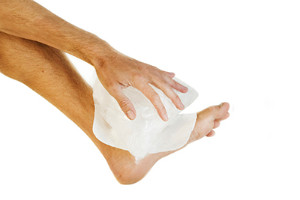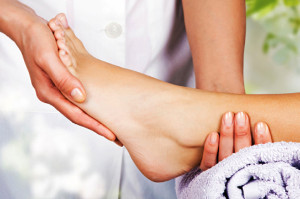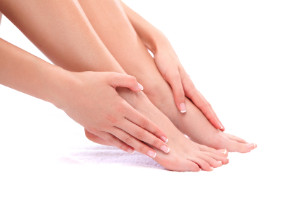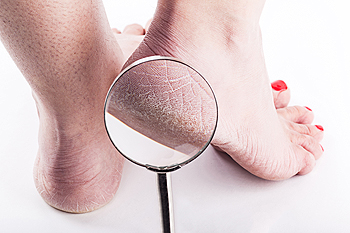





 Ankles are an important part of the human body's structure, since they provide the flexibility needed to walk. An ankle sprain occurs when there is a tear in the ligament. These tears can either be mild and result in a mild sprain, or they can be severe and cause a more serious sprain. Ankle sprains can happen to anyone regardless of age, and they can occur while performing any everyday activity. If you are suffering from a mild sprain, it is advised that you follow the RICE method, which stands for Rest, Ice, Elevation, and Compression. Anti-inflammatory medications may also be used to treat minor cases of ankle sprains.
Ankles are an important part of the human body's structure, since they provide the flexibility needed to walk. An ankle sprain occurs when there is a tear in the ligament. These tears can either be mild and result in a mild sprain, or they can be severe and cause a more serious sprain. Ankle sprains can happen to anyone regardless of age, and they can occur while performing any everyday activity. If you are suffering from a mild sprain, it is advised that you follow the RICE method, which stands for Rest, Ice, Elevation, and Compression. Anti-inflammatory medications may also be used to treat minor cases of ankle sprains.
Ankle sprains are common but need immediate attention. If you need your feet checked, contact one of our podiatrists from Active Foot and Ankle Care, LLC. Our doctors can provide the care you need to keep you pain-free and on your feet.
How Does an Ankle Sprain Occur?
Ankle sprains take place when the ligaments in your ankle are torn or stretched beyond their limits. There are multiple ways that the ankle can become injured, including twisting or rolling over onto your ankle, putting undue stress on it, or causing trauma to the ankle itself.
What Are the Symptoms?
Preventing a Sprain
Treatment of a Sprain
Treatment of a sprain depends on the severity. Many times, people are told to rest and remain off their feet completely, while others are given an air cast. If the sprain is very severe, surgery may be required.
If you have suffered an ankle sprain previously, you may want to consider additional support such as a brace and regular exercises to strengthen the ankle.
If you have any questions please feel free to contact our offices located in Fair Lawn, Riverdale, and Englewood, NJ . We offer the newest diagnostic and treatment technologies for all your foot and ankle needs.
 As you grow older, you may start to experience more problems with your feet. When dealing with your feet, it is crucial that you do not ignore any persistent pain you are feeling. You should perform daily foot inspections to ensure that there are no abnormalities. A helpful tip is to make sure you are wearing shoes that fit properly and are not worn out. When you go shoe shopping, you should go later in the day when the feet are at their largest. It is also important that you avoid wearing the same pair of shoes everyday. Lastly, avoid walking around barefoot, since doing so may make you more prone to infection and injury.
As you grow older, you may start to experience more problems with your feet. When dealing with your feet, it is crucial that you do not ignore any persistent pain you are feeling. You should perform daily foot inspections to ensure that there are no abnormalities. A helpful tip is to make sure you are wearing shoes that fit properly and are not worn out. When you go shoe shopping, you should go later in the day when the feet are at their largest. It is also important that you avoid wearing the same pair of shoes everyday. Lastly, avoid walking around barefoot, since doing so may make you more prone to infection and injury.
Everyday foot care is very important to prevent infection and other foot ailments. If you need your feet checked, contact one of our podiatrists from Active Foot and Ankle Care, LLC. Our doctors can provide the care you need to keep you pain-free and on your feet.
Everyday Foot Care
Often, people take care of their bodies, face and hair more so than they do for their feet. But the feet are a very important aspect of our bodies, and one that we should pay more attention to. Without our feet, we would not be able to perform most daily tasks.
It is best to check your feet regularly to make sure there are no new bruises or cuts that you may not have noticed before. For dry feet, moisturizer can easily be a remedy and can be applied as often as necessary to the affected areas. Wearing shoes that fit well can also help you maintain good foot health, as well as making it easier to walk and do daily activities without the stress or pain of ill-fitting shoes, high heels, or even flip flops. Wearing clean socks with closed shoes is important to ensure that sweat and bacteria do not accumulate within the shoe. Clean socks help to prevent Athlete’s foot, fungi problems, bad odors, and can absorb sweat.
If you have any questions please feel free to contact our offices located in Fair Lawn, Riverdale, and Englewood, NJ . We offer the newest diagnostic and treatment technologies for all your foot and ankle needs.
Read more about Every Day Foot Care If you have swelling, pain, redness, or infection near your big toe; you may have an ingrown toenail. Ingrown toenails result when the corner of a nail grows into the soft flesh that surrounds it. While ingrown toenails may cause minimal pain at first, they can spread and worsen very quickly. People who have diabetes or other serious conditions that cause poor blood flow to the feet are at a higher risk of developing ingrown toenails. Nevertheless, there are at-home remedies that can be performed in order to treat minor cases of ingrown toenails. One method is to soak your feet in warm water for 15 to 20 minutes a few times per day. Soaking will help reduce swelling along with tenderness in the feet. If you have an ingrown toenail that is progressively worsening, you should seek the assistance of a podiatrist right away.
If you have swelling, pain, redness, or infection near your big toe; you may have an ingrown toenail. Ingrown toenails result when the corner of a nail grows into the soft flesh that surrounds it. While ingrown toenails may cause minimal pain at first, they can spread and worsen very quickly. People who have diabetes or other serious conditions that cause poor blood flow to the feet are at a higher risk of developing ingrown toenails. Nevertheless, there are at-home remedies that can be performed in order to treat minor cases of ingrown toenails. One method is to soak your feet in warm water for 15 to 20 minutes a few times per day. Soaking will help reduce swelling along with tenderness in the feet. If you have an ingrown toenail that is progressively worsening, you should seek the assistance of a podiatrist right away.
Ingrown toenails can become painful if they are not treated properly. For more information about ingrown toenails, contact one of our podiatrists of Active Foot and Ankle Care, LLC. Our doctors can provide the care you need to keep you pain-free and on your feet.
Ingrown Toenails
Ingrown toenails occur when a toenail grows sideways into the bed of the nail, causing pain, swelling, and possibly infection.
Causes
Prevention
Because ingrown toenails are not something found outside of shoe-wearing cultures, going barefoot as often as possible will decrease the likeliness of developing ingrown toenails. Wearing proper fitting shoes and using proper cutting techniques will also help decrease your risk of developing ingrown toenails.
Treatment
Ingrown toenails are a very treatable foot condition. In minor cases, soaking the affected area in salt or antibacterial soaps will not only help with the ingrown nail itself, but also help prevent any infections from occurring. In more severe cases, surgery is an option. In either case, speaking to your podiatrist about this condition will help you get a better understanding of specific treatment options that are right for you.
If you have any questions please feel free to contact our offices located in Fair Lawn, Riverdale, and Englewood, NJ . We offer the newest diagnostic and treatment technologies for all your foot and ankle needs.
Read more about Ingrown Toenail Care Cracked heels can affect anyone of any age, and they are caused by a lack of moisture. Thankfully, at-home remedies may be performed in order to rid yourself of this unsightly condition. Prior to treating your cracked heels, it is crucial that you are aware of what may be causing them. Cold weather, harsh soaps, standing for long hours, and improper footwear have all been linked as causes of cracked heels. A simple treatment you can try for cracked feet is to soak them in warm soapy water for twenty minutes at night. Afterwards, try using a pumice stone to scrape off any dead skin you may have. You should then rinse your feet, and carefully dry them with a towel. Lastly, moisturize them with a foot cream and wear a pair of socks overnight in order to trap in the moisture. If you have a more severe case of cracked heels, you should not hesitate to seek help from a podiatrist.
Cracked heels can affect anyone of any age, and they are caused by a lack of moisture. Thankfully, at-home remedies may be performed in order to rid yourself of this unsightly condition. Prior to treating your cracked heels, it is crucial that you are aware of what may be causing them. Cold weather, harsh soaps, standing for long hours, and improper footwear have all been linked as causes of cracked heels. A simple treatment you can try for cracked feet is to soak them in warm soapy water for twenty minutes at night. Afterwards, try using a pumice stone to scrape off any dead skin you may have. You should then rinse your feet, and carefully dry them with a towel. Lastly, moisturize them with a foot cream and wear a pair of socks overnight in order to trap in the moisture. If you have a more severe case of cracked heels, you should not hesitate to seek help from a podiatrist.
Cracked heels are unsightly and can cause further damage to your shoes and feet. If you have any concerns, contact one of our podiatrists from Active Foot and Ankle Care, LLC. Our doctors can provide the care you need to keep you pain-free and on your feet.
Cracked Heels
Cracked heels appear unappealing and can make it harder for you walk around in sandals. Aside from looking unpleasant, cracked heels can also tear stockings, socks, and wear out your shoes. There are several methods to help restore a cracked heel and prevent further damage.
How Do You Get Them?
Dry skin is the number one culprit in creating cracked heels. Many athletes, walkers, joggers, and even swimmers suffer from cracked heels. Age and skin oil production play a role to getting cracked heels as well.
Promote Healing
Over the counter medicines can help, especially for those that need instant relief or who suffer from chronic dry feet.
Wear Socks – Wearing socks with medicated creams helps lock in moisture.
Moisturizers – Applying both day and night will help alleviate dryness which causes cracking.
Pumice Stones – These exfoliate and remove dead skin, which allows for smoother moisturizer application and better absorption into the skin.
Change in Diet
Eating healthy with a well-balanced diet will give the skin a fresh and radiant look. Your body responds to the kinds of food you ingest. Omega-3 fatty acids and zinc supplements can also revitalize skin tissue.
Most importantly, seek professional help if unsure how to proceed in treating cracked heels. A podiatrist will help you with any questions or information needed.
If you have any questions, please feel free to contact our offices located in Fair Lawn, Riverdale, and Englewood, NJ . We offer the newest diagnostic and treatment technologies for all your foot care needs.
Read more about Solutions for Cracked Heels





